COP21, Paris, France
The United Nations Climate Change Conference (COP21) in Paris, France, on 30
November-11 December 2015 was launched by 150 Heads of State and Government
to adopt a legally-binding agreement on the reduction of greenhouse gases
necessary to prevent dangerous climate change. There were two parts to the
conference on the same site at Le Bourget in the suburbs of Paris. Some
20,000 delegates and observers were accredited to the Conference of the
Parties (COP) of the UN Framework Convention on Climate Change (UNFCCC)
where the negotiations took place and where associated side events were
organized to inform the delegates. Next door, the French Government created
a Climate Generations area where 10,000 members of the public and
representatives of organizations not accredited to the conference discussed
the issues and considered possible solutions. There were stands for civil
society organizations, research centers and local governments; forums for
indigenous peoples and biodiversity conservation; projections of films; and
conference rooms for organizations to hold events, present panels of
speakers on relevant themes, and debate the issues before the conference.
Many official delegates also participated.
The International Environment Forum organized four events at COP21, with a
detailed report at https://iefworld.org/cop21.
I was a speaker at all four events and did much of the organization. The IEF
and Baha'i delegations totaled 12 people, and some other Baha'is also came
in support.
The Baha'i International Community prepared a beautiful statement for the
conference: "Shared
Vision, Shared Volition: Choosing Our Global Future Together. A
statement of the Bahá'í International Community to the United Nations
Climate Change Conference in Paris, France" which we distributed at the
conference. It is available on the IEF web site (also in French) at https://iefworld.org/bic_cop21.
The conference concluded successfully on 12 December with an ambitious
agreement to limit global warming to under 2°C aiming for 1.5°C, although
much still needs to be done to reach this ambitious goal, which implies
abandoning a fossil-fuel-based economy.
IEF-related events at COP21
(see detailed reports at https://iefworld.org/cop21)
The first International Environment Forum event in the Climate Generations
area was on 5 December on the topic "Community
resilience in the face of climate-driven extreme events, a Vanuatu case
study". I summarized the importance for climate change adaptation
of local community resilience and presented a case study of the experience
of the Baha'i community on the island of Tanna, Vanuatu, after being hit by
cyclone Pam in March 2015, followed by a 10 minute video about the Baha'i
community's social cohesion and solidarity after the disaster. Serik
Tokbolat, Representative of the Baha'i International Community to the United
Nations, New York Office, discussed the tools used by the Baha'is for
building social cohesion in communities and neighbourhoods. Janot Mendler de
Suarez summarized academic studies of the characteristics of successful
community solidarity, and Temily Tavangar provided a recent example of a
town in Malaysia hit by the worst flooding in its history.
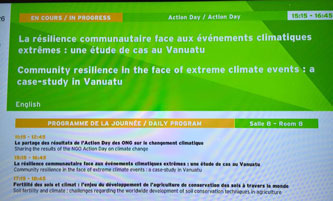 .
. 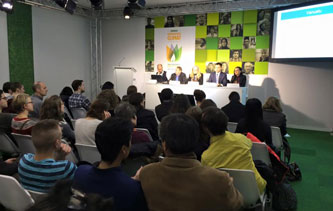 .
. 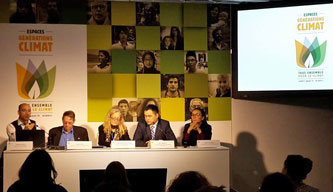
The electronic notice board for the event; the IEF panel and part of
the audience; chair Ismael Velasco, Arthur Dahl, Janot Mendler de Suarez,
Serik Tokbolat, Temily Tavangar (photos P. Adriance, O. Vinkhuyzen and T.
Tavangar)
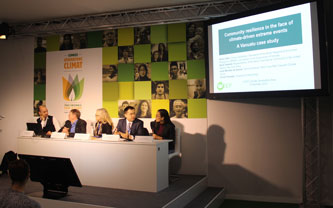 .
. 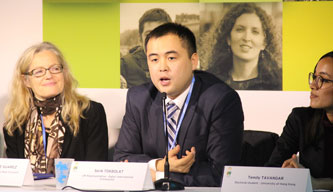 .
. 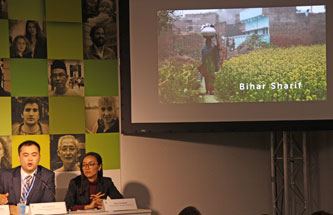
The panel; Serik Tokbolat (photos T. Tavangar)
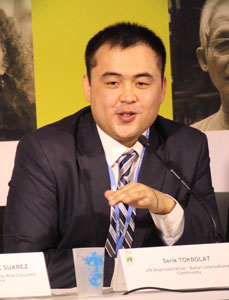 .
. 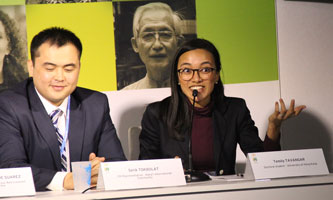 .
. 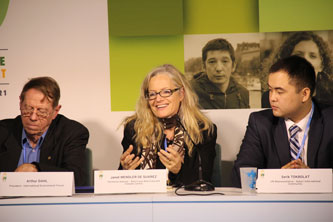
Serik Tokbolat; Temily Tavangar; Janot Mendler de Suarez
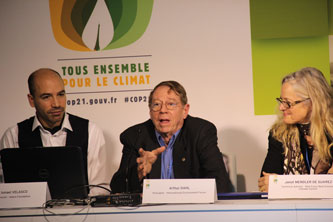 .
. 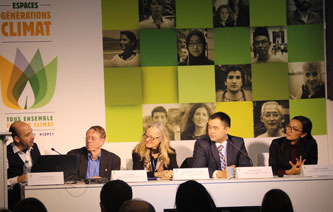
Arthur Dahl; chair Ismael Velasco and the panel
IEF board member Peter Adriance was the first speaker on a panel in a side
event on 5 December at the intergovernmental conference on "Examination
of How Nations Have and Should Consider Equity and Justice in Setting
INDCs".

Panel on Equity and Justice (photo by IISD)
Peter spoke on the importance of an ethical approach based on equity
and justice in governmental decision-making. He noted the presence of faith
communities in the climate change negotiations, and called for empathy
towards other people when developing INDCs, stressing that “we are a single
people on a single planet.” He pointed to statements from several faith
leaders in the past year on the relationship between people and the Earth,
underscoring that 80% of the global population profess a faith.
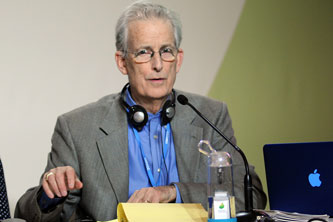
Peter Adriance (photo by IISD)
On Wednesday 9 December, IEF co-sponsored a side event on Accountability
after Paris in the Netherlands Pavilion at the intergovernmental
conference. The Moderator was Robert Whitfield, chair of the One World
Trust. My good friend Sylvia Karlsson-Vinkhuyzen, who organized the event
spoke on "Four pathways for accountability – challenges and opportunities".
I then discussed "the Role of Science in Accountability" as a last-minute
replacement for a speaker who was unable to attend, before making a second
presentation on "Personal and professional accountability: an ethical
challenge", reflecting on the role of a personal approach to accountability
and responsibility among decision-makers and civil servants (see the paper
at https://iefworld.org/ddahl15h).
Excellent
commentaries were provided by two delegates from governments, Mr. Arias
(Marshall Islands) and Kennedy Graham MP (New Zealand).
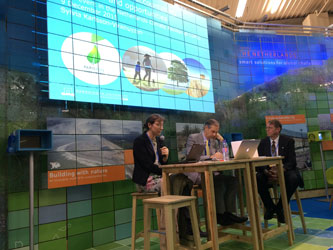 .
. 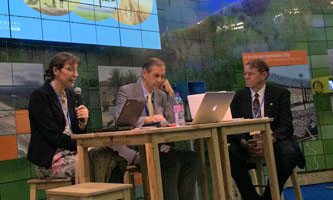 .
. 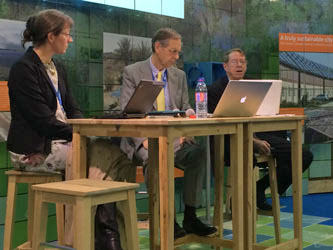
Event in Netherlands Pavilion, Sylvia Karlsson-Vinkhuyzen, moderator
Robert Whitfield, Arthur Dahl
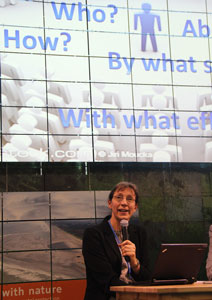 .
. 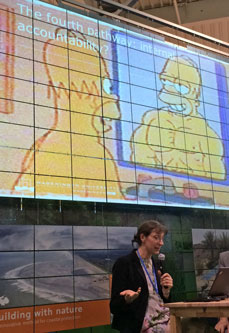 .
. 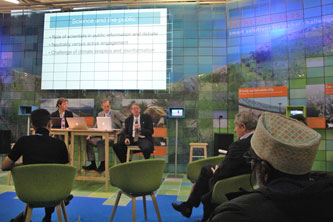
Sylvia Karlsson-Vinkhuyzen speaking; part of the audience
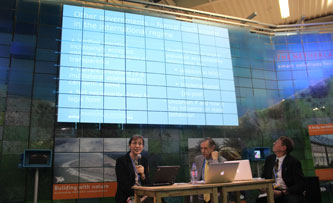 .
. 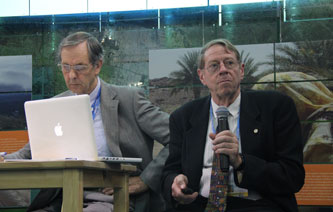 .
. 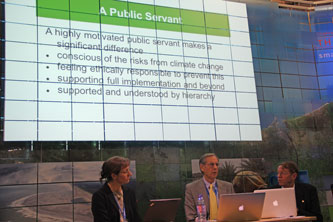
Sylvia presenting; Arthur Dahl speaking

On Thursday 10 December, while the diplomats were trying to find consensus
on the remaining outstanding issues in the Paris Agreement on Climate
Change, the IEF held its second event in the Climate Generations area on "Principles
for accountability for climate change agreements". The chairperson
was Peter Adriance, Representative for Sustainable Development of the U.S.
Baha'i Office of Public Affairs, and the room quickly filled to overflowing.
Sylvia Karlsson-Vinkhuyzen was the opening speaker on the topic "Principles
- the ethical foundations for accountability relationships". Dr.
Mojgan Sami of the University of California Irvine Program in Public Health
gave a very dynamic presentation on the Policy
Paradox. The next presentation was by Prof. Victoria Thoresen,
UNESCO Chair for Education about Sustainable Lifestyles, on "Implementing
Commitments". I again spoke on "Personal
and Professional Accountability: An Ethical Challenge". This was
followed by a lively discussion that continued in the corridors long after
the end of the session.
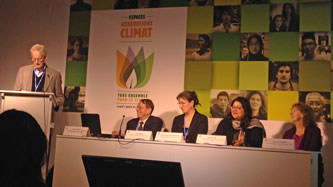 .
. 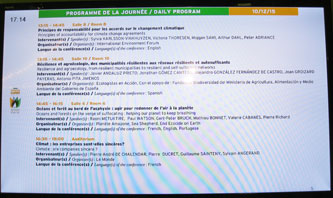 .
. 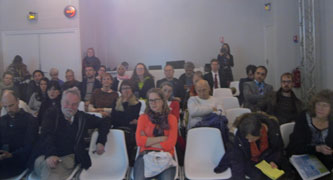
IEF event; the daily programme board; part of the audience
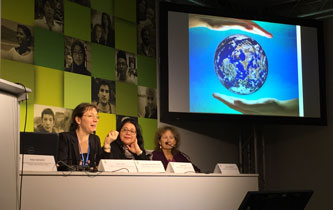 .
. 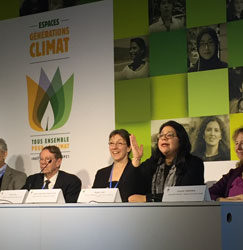 .
. 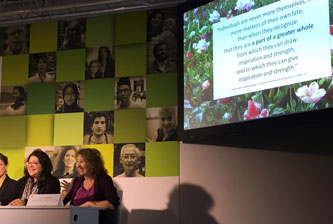
Sylvia Karlsson-Vinkhuyzen; Mojgan Sami; Victoria Thoresen
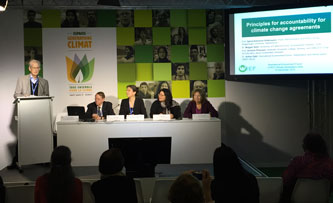
Peter Adriance chaired the panel
On Friday 11 December, the last day of the Climate Generations area, the IEF
organized its last event on Values-based
climate change education. The panel shared experiences in
values-based education for responsible living to motivate adjustments in
mindsets and behavior individually and in communities. An audience of about
70 people crowded into the room meant for 50. Victoria Thoresen opened the
session with a presentation on "Values-based
Education
for Climate Change". The next presentation was on "Values-Based
Climate Education: Cracking The Behaviour Change Challenge" by
Ismael Velasco. I followed with a presentation on "Implementing
Values-based Climate Change Education". The final presentation was
by Peter Adriance, who described the American Baha'i interfaith work on
climate change, and the resulting approach to climate change education.
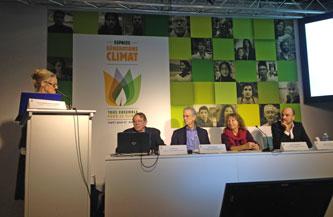 .
. 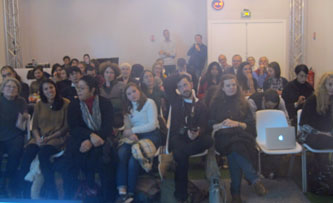 .
. 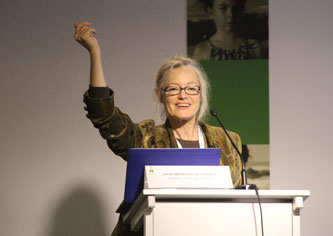
The IEF panel; part of the audience; Janot Mendler de Suarez
animating the discussion after the panel
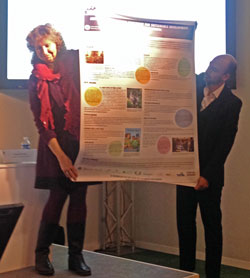 .
. 
A poster illustrating Peter Adriance's presentation; after
the panel, the audience was invited to cluster around the room by common
interests
Intergovernmental Conference area (the Blue Zone)
Most of the Le Bourget site was in the Blue Zone under United Nations
responsibility where the Conference of the Parties negotiations and main
side events took place. Only accredited delegates and observers had access
to this zone, with extensive meeting rooms, offices for delegations,
pavilions for governments and organizations and support facilities, in many
buildings along a long central avenue. Much of the area was reserved for
confidential negotiations, but there were also many side events in
conference rooms and the pavilions of governments and organizations. The IEF
co-sponsored one event organized by IEF board member Sylvia
Karlsson-Vinkhuyzen in the Netherlands Pavilion. I also met many old
colleagues and friends, including from the Secretariat of the Pacific
Regional Environment Programme (SPREP) that I organized more than 30 years
ago.
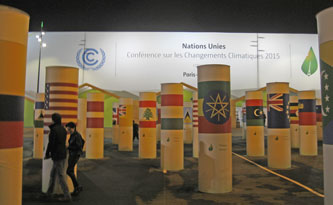 .
. 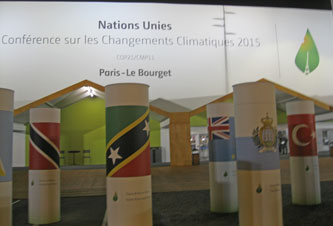
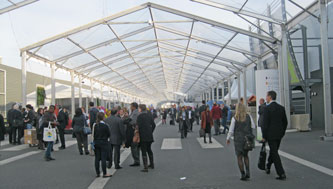 .
. 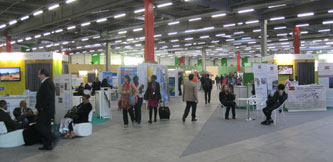 .
. 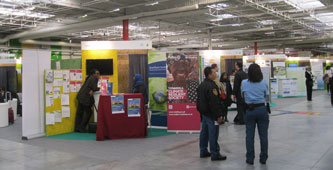
The central avenue in the Blue Zone; some of the exhibit space and
booths for organizations
SPREP
I re-established contact with the Secretariat of the Pacific Regional
Environment Programme (SPREP) which I organized 35 years ago, and which is
now a major regional intergovernmental organization with a staff of a
hundred.
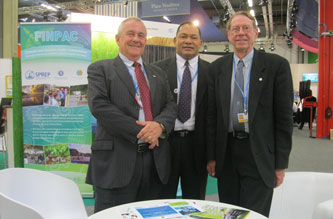
.
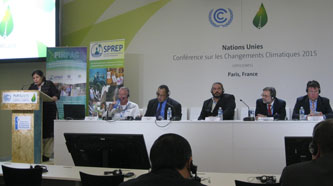 Three heads of SPREP, outgoing Director General David Sheppard,
incoming Director General Kosi Latu, founding Coordinator Arthur Dahl; a
SPREP event
Three heads of SPREP, outgoing Director General David Sheppard,
incoming Director General Kosi Latu, founding Coordinator Arthur Dahl; a
SPREP event
The Climate Generations area at COP21
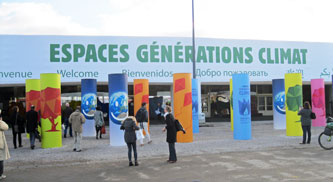 .
. 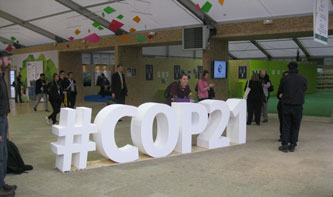 .
. 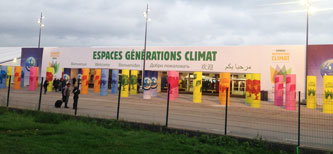
Entrance to the Climate Generations areas (Green zone); the hashtag
#COP21
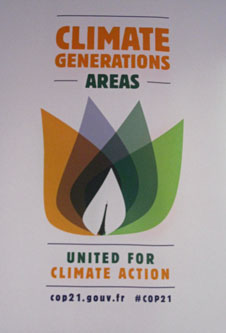 .
. 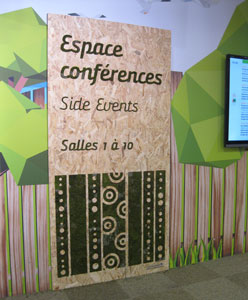
The Climate Generations logo; the IEF side events were in the
conference rooms
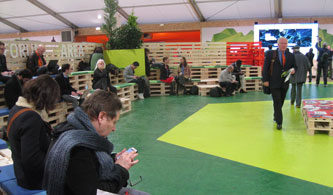 .
.
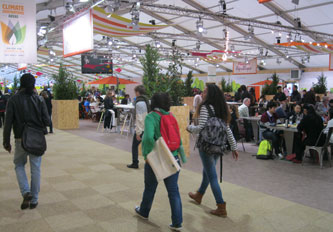 .
. 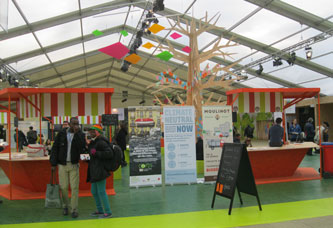
There were central meeting, working and eating areas
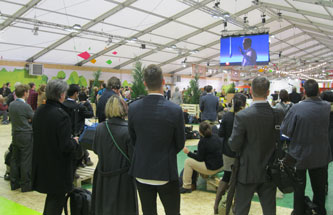
Watching the transmission of Al Gore's speach
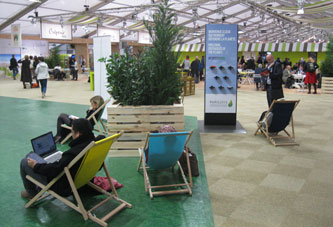 .
. 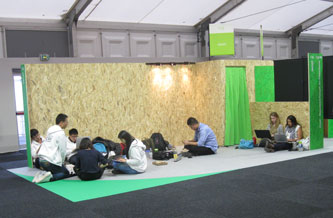 .
. 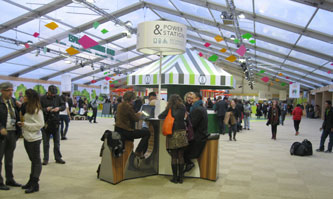
Places to rest and catch up with emails or check the conference
programme; even a place to pedal to recharge your phone
Lectures were held in various locations
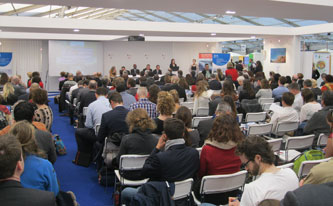 .
. 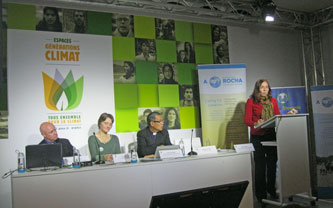 .
. 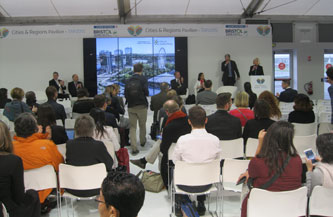
Lectures on biodiversity and climate; a panel on Climate and Faith by
the evangelical churches; presentations on cities and regions
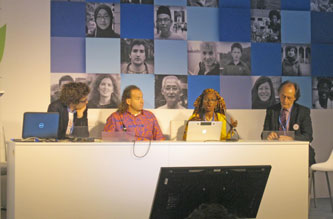
Event on human rights and climate change
Parades
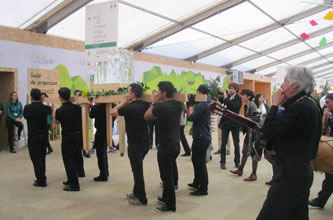 .
. 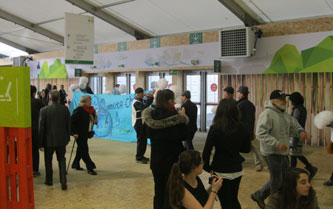 .
.
A dirge and blocks of melting ice for an "ice funeral"; a banner with
people in costume
Exhibits and booths for organizations
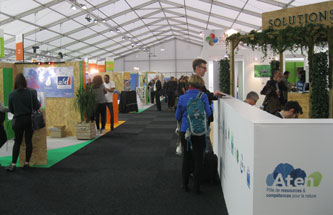 .
. 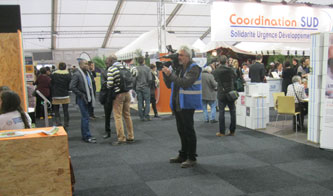 .
. 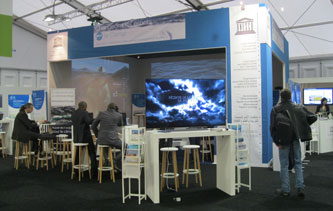
One of three exhibition areas; the press were active; the UNESCO
booth
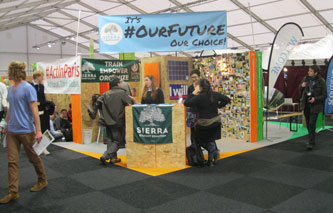 .
. 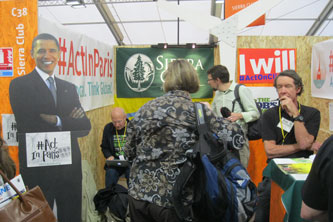 .
. 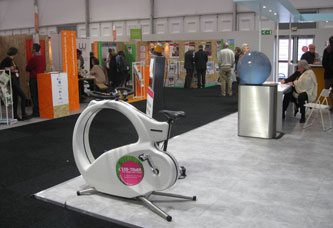
The Sierra Club was present, and you almost thought that President
Obama was manning their booth; new technologies were on
display
International Environment Forum
delegation
After our first event on 5 December, many of the Baha'is went to dinner
together.
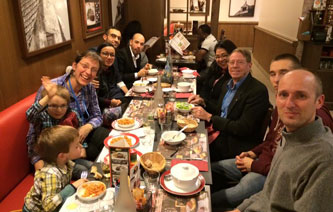 .
. 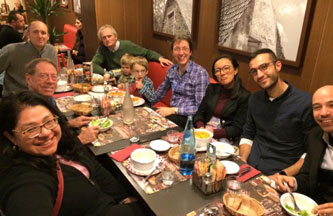
(photos P. Adriance)
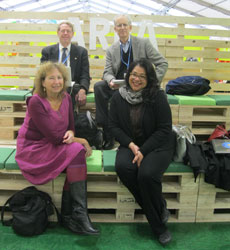 .
. 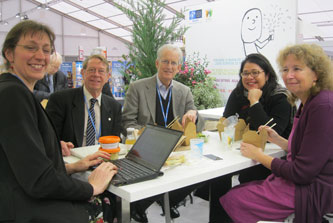
Victoria Thoresen, Arthur Dahl, Peter Adriance, Mo Sami; working
lunch with Sylvia Karlsson-Vinkhuyzen
On the last day of the conference, we met for a wrap-up session to share
experience.
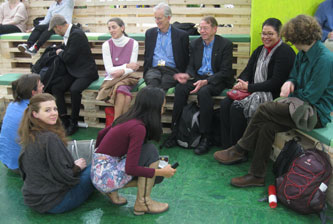 .
. 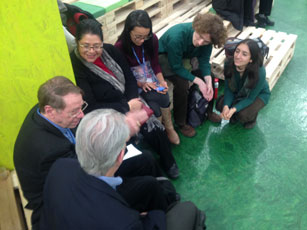 .
. 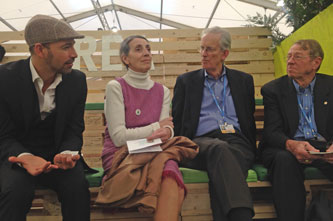
Meeting of the IEF team; Ismael, Peter and Arthur with a French radio
journalist
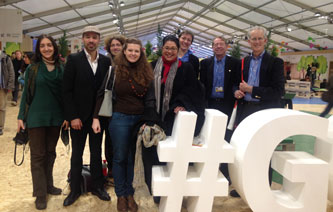 .
. 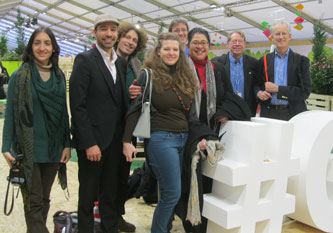 .
. 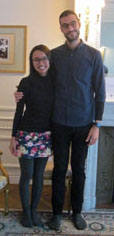
Part of the IEF team (photo by Alessia Freddo); Temily and Babak
Tavangar
 .
. 
 .
.  .
. 
 .
.  .
. 
 .
.  .
. 
 .
. 


 .
.  .
. 
 .
.  .
. 
 .
.  .
. 

 .
.  .
. 
 .
.  .
. 

 .
.  .
. 
 .
. 
 .
. 
 .
.  .
. 
 .
. 
 .
.  .
. 
 .
. 
 .
.
 .
. 

 .
.  .
. 
 .
.  .
. 

 .
.  .
.  .
.  .
. 
 .
.  .
. 
 .
. 
 .
. 
 .
.  .
. 
 .
.  .
. 